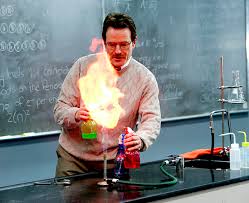Overview
Many students in high school decide to take a chemistry class to fulfil a science requirement for graduation, in order to attend college, or as a basis for a later career in medicine or one of the other sciences. In order to be successful in chemistry, students take part in lab experiments and participate in class discussions, students should be able to read assigned material carefully, apply the vocabulary of chemistry, and use mathematics appropriately when needed.
Figure 1: Success in chemistry class depends on four elements.
Lab Experiments and Class Participation
For some students, the best part of chemistry class is doing lab experiments. They learn to follow directions precisely, and keep careful, detailed records in their chemistry notebooks. For others, the worst part of chemistry class is doing lab experiments, because something always goes wrong. They also learn to keep detailed records of what happened. Sometimes the teacher does a demonstration of a chemical reaction as a springboard for class discussion. In many chemistry classes, there is a class participation requirement, and teachers take it seriously.
Figure 2: Students and teachers participate in chemistry classes.
Reading Chemistry
The history of chemistry is exciting, with experiments, discoveries, a lot of twists and turns, and visions of the future. Unfortunately, the assigned textbook may or may not convey the same sense of anticipation. There are a lot of facts to memorize, chemical formulas, lists, and terms with unfamiliar meanings. When a textbook chapter is assigned, first do some prereading. Note the title of the chapter, and the topics the chapter will cover? Those topics are given as topic subheadings. Are there diagrams of processes and equations? Make notes of those things before reading the chapter, and then read the chapter. This will give a study outline as well as organizing thoughts, and can be used as a study guide before the test.
The Vocabulary of Chemistry
The language of chemistry is specialized. It includes the arrangement of elements in the periodic table, with their abbreviations; the symbol language of chemical equations and formulas; all kinds of terminology for chemical processes; the laws of chemistry; and rigorous application of the scientific method. Some of the language will come from the reading, and some will come from the class itself.
Figure 3: The specialized vocabulary of chemistry includes the arrangement and elements of the periodic table.
Applications of Mathematics
The sciences are filled with applications of mathematics, and chemistry is no exception. Many high schools require students to have taken algebra and geometry before taking chemistry, or be taking a math class at the same time. In order to be successful in balancing chemical equations, students are required to use those mathematical concepts, which enables them to learn how equations actually work.
Figure 4: An example of the application of mathematics to chemical reactions.
Interested in chemistry tutoring services? Learn more about how we are assisting thousands of students each academic year.
SchoolTutoring Academy is the premier educational services company for K-12 and college students. We offer tutoring programs for students in K-12, AP classes, and college. To learn more about how we help parents and students in Ithaca, NY: visit Tutoring in Ithaca, NY






